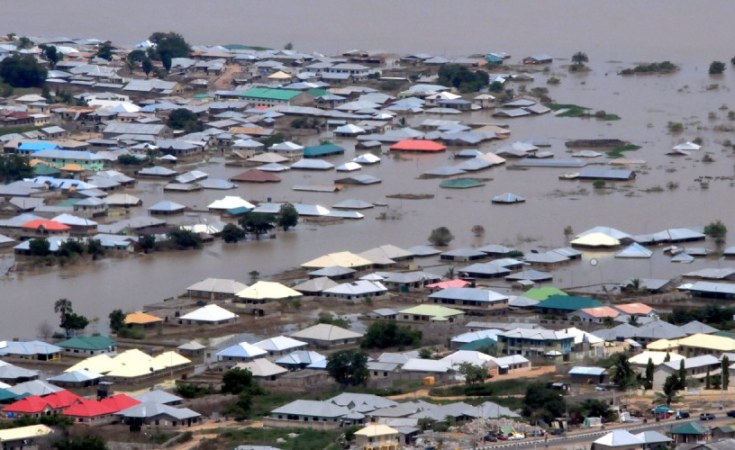In Kaduna, the state government said it had dredged River Kaduna as part of measures to reduce triver's annual floodingver and its tributaries.
Following the prediction of the National Emergency Management Agency (NEMA) of flooding across the country, three states in the North-west region have taken measures such as the relocation of people from flood-prone areas, to mitigate the adverse impacts of flood.
Using resources from the Nigerian Meteorological Agency and Nigeria Hydrological Services Agency, NEMA predicted severe flooding across the country this year and advised relevant authorities to take appropriate action to avert the worst impact of flooding.
Last year, there was unprecedented flooding across the country with millions of acres of farmlands and properties worth billions destroyed. The flood also caused the death of more than 500 people and displaced several thousands more.
The News Agency of Nigeria (NAN) reports that the governments of Kaduna, Katsina and Kano States have taken heed of the NEMA's warning and have already started putting mitigation measures in place.
In Kaduna, the state government said it had dredged River Kaduna as part of measures to reduce the annual flooding of the river and its tributaries.
The dredging was done to increase the depth of the waterline to between 2.5 meters and 3 metres, and its tributaries to at least 1.5 to 2 metres.
Haira'u Umar, the director of environment, at Kaduna Capital Territory Authority, told NAN that the dredging has helped in checking flooding in the Kaduna metropolis and its environs.
Mrs Umar said the dredging of rivers around flood-prone communities in the state will be a continuous process.
She listed the flood-prone communities as Hayin Danmani, Kamazou, Kabala West, Rafinguza and other flood plains within Kaduna North, Kaduna South, Chikun and Igabi Local Government Areas.
Similarly, Yusuf Muazu, the state's director of environment, said the government had been working with stakeholders on flood mitigation efforts.
He said the Ministry of Environment and the Nigeria Erosion and Watershed Management Project (NEWMAP) had installed Automated Flood Early Warning Systems and Weather Stations as part of efforts to mitigate flooding.
Similarly, the State Emergency Management Agency (KADSEMA) has identified people living along waterways, documented them, and commenced demolition of some of the houses, in collaboration with relevant agencies in the state.
Muhammed Mukaddas, the KADSEMA executive secretary, said that following NiMet's seasonal prediction of 2022 probable risks, 5,000 Households were assessed and supported with N35,000 unconditional cash transfers each, to relocate to safety temporarily.
"UNICEF through Red Cross and SOCU disbursed the sum of N175 million to 5,000 households to enable the vulnerable residents to afford temporary shelters ahead of the flash flood," Mr Mukaddas said.
Meanwhile, in Katsina State, where a flood recently claimed the lives of two people in the state capital, the governor, Dikko Radda, has promised to step up measures through awareness creation to prevent flood disasters.
The governor did not, however, specify the measures the government will take to mitigate flooding, which has already affected many communities in Katsina, the state capital.
In Kano, the State Emergency Management Agency (SEMA), said it has been monitoring and collaborating with relevant stakeholders to implement strategies and emergency response plans to mitigate flooding in the state.
The executive secretary of SEMA, Isyaku Kubarachi, told NAN that the stakeholders were local emergency management committees, non-governmental and civil society organisations, among others.
"We have embarked on sensitization campaigns on radio, television markets, the five Emirate Councils and communities across the 44 local government areas of the state to ensure they clear waterways to minimize flooding," he said.
Nuradeen Abdullahi, NEMA's territorial coordinator in Kano, called for strict enforcement of environmental regulations to mitigate flooding, and advised residents to avoid using substandard building materials.
An environmental expert, Lawal Abdulrashid of the Umaru Musa Yar'adua University, Katsina, said only proper urban planning would put an end to the recurring floods in the country.
Mr Abdulrashid, a professor, said government must stop the erection of structures on waterways, and take preventive measures against dumping of refuse in drainages.
Another environmentalist, Abubakar Kabir, called on relevant agencies of government at national and state levels to invest in the prevention and provision of necessary infrastructure needed to address incessant flooding in the country.
Mr Kabir also said the government must enforce laws on preserving the environment to check the recurrence of flooding and attendant disasters.
He warned of more flood disasters unless the habit of erecting structures on waterways, disposing garbage in drains and violating town planning master plans were checked.


